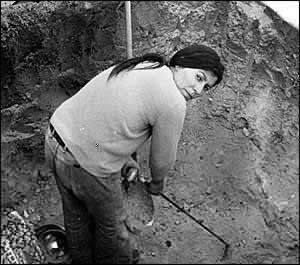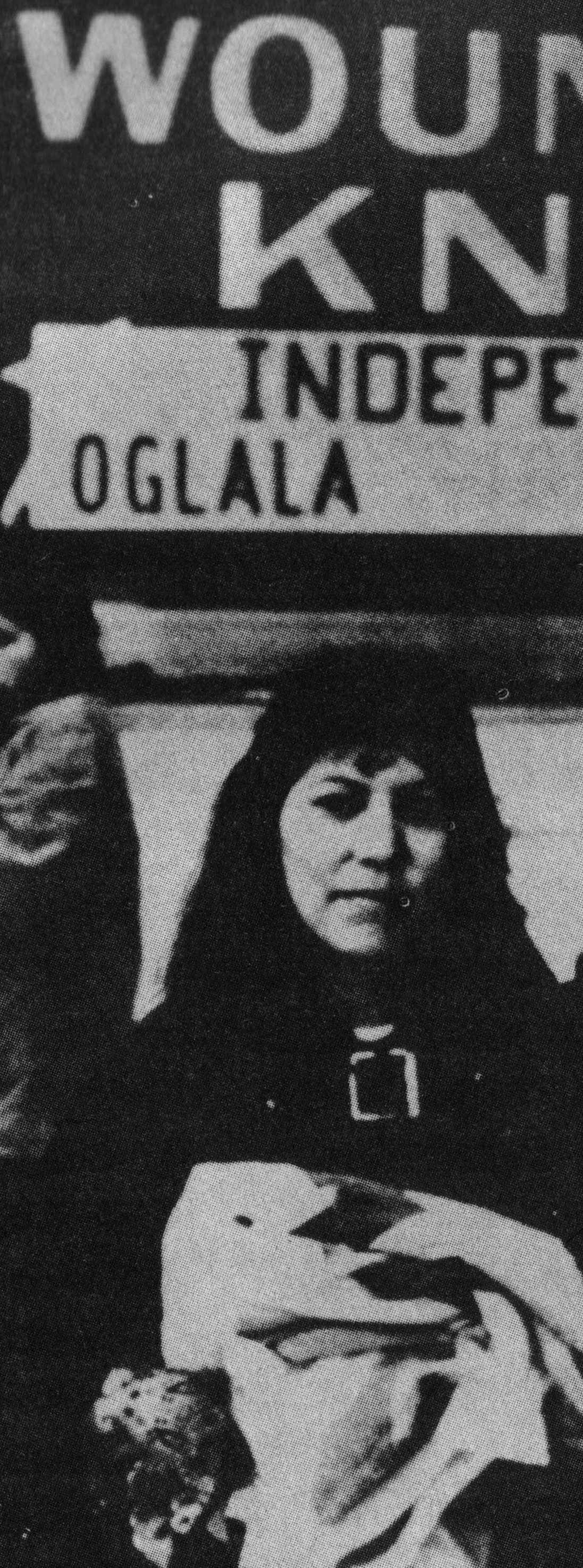
Anna Mae Pictou Aquash, Mi’kmaq Nation
“…arrest everyone, throw them in jail, and they feel that’s the end of the problem, and I don’t, that’s no solution to any problem.”
Jails are not a solution to problems – Anna Mae Pictou Aquash interviewed by Candy Hamilton (1975)

Women with the Native Youth Movement of Vancouver show support for Anna Mae Pictou Aquash, Leonard Peltier and John Graham, outside the BC Supreme Court in Vancouver (March 1, 2004)
“They offered me my freedom and money if I’d testify the way they wanted. I have those two choices now. I chose my kind of freedom, not their kind, even if I have to die. They let me go because they are sure I’ll lead them to Peltier. They’re watching me. I don’t hear them or see them, but I know they’re out there somewhere. I can feel it.”
Anna Mae Pictou Aquash, speaking about federal agents, quoted by Mary Crow Dog and Richard Erdoes in the book ‘Lakota Woman‘ (1990)
Our roots shall continue to push up your cement
Our blades of grass shall continue to sprout up between your sidewalks
Our rivers shall continue to run over their banks
When the last drop of my blood enters mother earth
(Which will be my children’s children)
Then we will be nourished into trees, grass, mountains, rocks
For we are mother earth
We are Indians
– Annie Mae Pictou
Naguset Eask (Micmac)
November 19, 1975
Killed February 1976 after being threatened with death by FBI Agent David Price
Text as it appeared in the newsletter ‘Crazy Horse Spirit’, Volume II, Number 1, Winter 1983-1984, International Office of the Leonard Peltier Defense Committee, Seattle

Anna Mae Pictou Aquash digs bunker at 1973 armed liberation of Wounded Knee (Lakota Nation)
“South Dakota is a very racist state, I am sure I will be sent up even though it is my first arrest… I knew that it would come… My efforts to raise the consciousness of whites that are so against Indians here in the United States were bound to be stopped by the FBI…”
Anna Mae Pictou Aquash, in a letter to her sister Rebecca Julian, after her November 1975 arrest in Oregon by State Troopers acting on FBI information, quoted in the book ‘The Life and Death of Anna Mae Aquash‘ by Johanna Brand (1978)
“They want to destroy our spirit. They want us to not understand our natural relationship to the earth and our relationship to our spirit. They want us to continue to give respect and validity to their forms of power…”
Anna Mae Pictou Aquash, Statement to the Court of South Dakota, (September 1975)
Anna Mae Pictou Aquash’s History of Resistance (actions and activities she took part in)
1969
– Aquash is arrested in Boston after jumping onto a group of police when they arrested a friend of hers who was assaulted at a bar.
1970
– Boston Indian Council and AIM demonstration against Mayflower II, Thanksgiving Day.
1972
– Trail of Broken Treaties leading to occupation of Bureau of Indian Affairs headquarters in Washington DC.
1973
– Armed liberation of Wounded Knee, Pine Ridge, Lakota territory
1974
– Training in Karate at AIM gym.
– Armed re-occupation of Anicinabe Park in Kenora, Ontario, by the Ojibway Warriors Society.
– Research, teaching and creating programs for the Red Schoolhouse, AIM Survival School in St. Paul, Minnesota.
– Re-organization of Los Angeles AIM chapter, fundraising and expulsion from office of then suspected FBI informant Douglass Durham (later confirmed).
1975
– Armed occupation of religious building (Alexian Brothers’ Novitiate) in Gresham, Wisconsin, by Menominee Warrior Society.
– Farmington, New Mexico, AIM convention related to racist murders of Navajos.
– Security and health for traditionalists at Pine Ridge, South Dakota, Lakota territory.

Anna Mae Pictou Aquash at the armed re-occupation of Wounded Knee in 1973
Also
Jails are not a solution to problems – Anna Mae Pictou Aquash interviewed by Candy Hamilton (1975)
Indian Activist Killed: Body Found on Pine Ridge, by Candy Hamilton (1976)
Anna Mae Lived and Died For All of Us, by the Boston Indian Council (1976)
The Brave-Hearted Women: The Struggle at Wounded Knee, by Shirley Hill Witt (1976)
Repression on Pine Ridge, by the Amherst Native American Solidarity Committee (1976)
Chronology of Oppression at Pine Ridge, from Victims of Progress (1977)
Excerpts from Leonard Peltier’s Trial Statements With Regard to Anna Mae Pictou Aquash (1977)
The Life and Death of Anna Mae Aquash, by Johanna Brand (1978)
Review of ‘The Life and Death of Anna Mae Aquash’, by Akwesasne Notes (1978)
Anna Mae Aquash, Indian Warrior, by Susan Van Gelder (1979)
Indian Activist’s Bold Life on Film, by John Tuvo (1980)
Poem for Nana, by June Jordan (1980)
Lakota Woman, by Mary Brave Bird and Richard Erdoes (1990)
Pine Ridge warrior treated as ‘just another dead Indian’, by Richard Wagamese (1990)
Leonard Peltier Regarding the Anna Mae Pictou Aquash Investigation (1999-2007)
A Report on the Case of Anna Mae Pictou Aquash, by Zig-Zag (2004)
Free John Graham – Honour Anna Mae Aquash (2009)
Feds to re-examine Pine Ridge cases, by Kristi Eaton (2012)
A Concise Chronology of Canada’s Colonial Cops, by M.Gouldhawke (2020)
Anna Mae Pictou Aquash: Warrior and Community Organizer, by M.Gouldhawke (2022)
